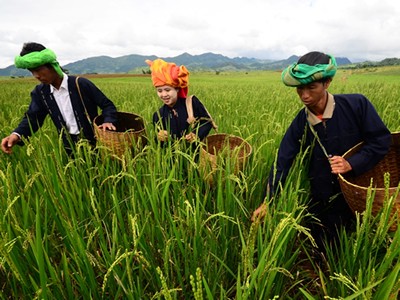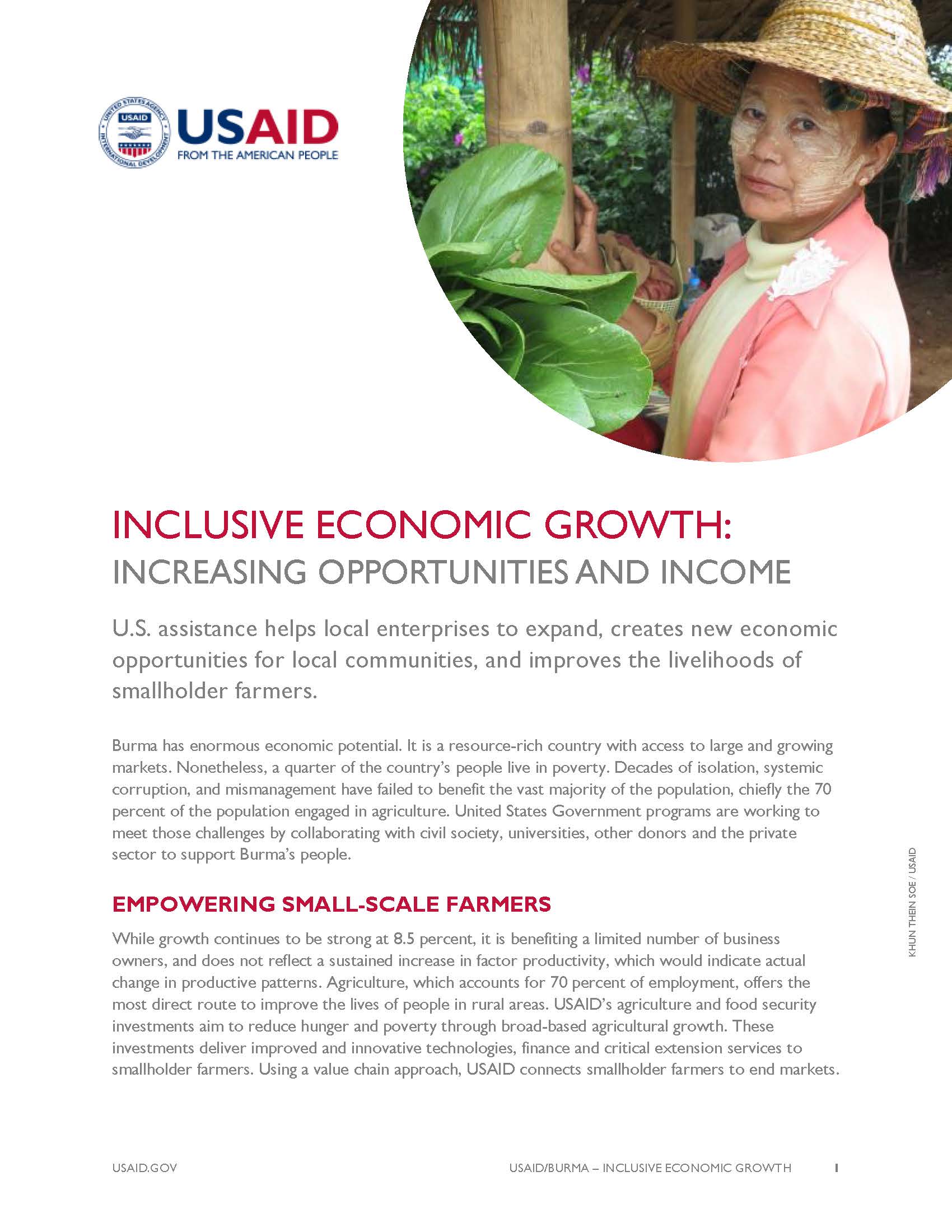
OVERVIEW
U.S. assistance helps local enterprises to expand, creates new economic opportunities for local communities, and improves the livelihoods of smallholder farmers.
Burma has enormous economic potential. It is a resource-rich country with access to large and growing markets. Nonetheless, a quarter of the country’s people live in poverty. Decades of isolation, systemic corruption, and mismanagement have failed to benefit the vast majority of the population, chiefly the 70 percent of the population engaged in agriculture. United States Government programs are working to meet those challenges by collaborating with civil society, universities, other donors and the private sector to support Burma’s people.
EMPOWERING SMALL-SCALE FARMERS
While growth continues to be strong at 8.5 percent, it is benefiting a limited number of business owners, and does not reflect a sustained increase in factor productivity, which would indicate actual change in productive patterns. Agriculture, which accounts for 70 percent of employment, offers the most direct route to improve the lives of people in rural areas. USAID’s agriculture and food security investments aim to reduce hunger and poverty through broad-based agricultural growth. These investments deliver improved and innovative technologies, finance and critical extension services to smallholder farmers. Using a value chain approach, USAID connects smallholder farmers to end markets.
GIVING PEOPLE A VOICE IN REFORMS
The political and economic reforms are deeply intertwined in Burma. The political reforms started, in part, from the realization that the country had fallen profoundly behind its neighbors in economic terms. Early economic reforms have started to open the door to broader consultation on economic governance and ultimately better policies, but this is just beginning. Much of the country looks the way it did in the 1950s. USAID is introducing international best practices for consultative economic rulemaking and building civil society capacity to participate in the reforms that will most affect peoples’ economic lives. USAID is also directly supporting emerging entrepreneurs, women’s groups, and technologies that have the power to create growth for all segments of society.
KEY RESULTS
- Introduced a proven model known as “fertilizer deep placement” that resulted in an average 28 percent increase in rice yield using one-third less fertilizer.
- Assisted over 2.8 million people, including some of the poorest and most vulnerable rural families with better agricultural technologies and finance.
- Supported the development, testing, selection, multiplication and diffusion of new varieties of stress-tolerant rice for farmers in both the Delta and the Dry Zone to help millions of farmers to better withstand or recover from natural disasters and adapt to climate.
- Mobilized civil society and the private sector to advocate for laws and policies that give smallholder farmers land tenure security, choice of what crops to grow, access to finance, and freedom to form associations and increase their bargaining power, including a “first of its kind in Burma” process for the development of a nation-wide land use policy and improved land governance, which met high international standards for transparency and inclusiveness.
- Using international treaties on commercial law as an entry point, USAID promotes the development of transparent and participatory legislative processes to alleviate constraints for new economic participants. USAID assistance creates real competition and facilitates the growth of a more dynamic private sector that creates jobs and raises incomes.
- Supported the opening of the Tech Sector in Burma through advocacy from top U.S. firms, such as Google, and building local capacity to develop new hardware and software applications that meet local needs, generate jobs, and transform other sectors of the economy.
- Encourages U.S. companies to model responsible investment and principled business practices, while reducing Burma’s trade and regulatory barriers.
USAID IS COMMITTED to supporting rural development to alleviate poverty and economic inequality. Transparent and inclusive economic development is critical to successful democratic transition.









Comment
Make a general inquiry or suggest an improvement.